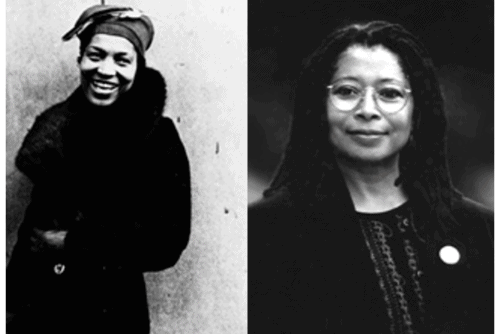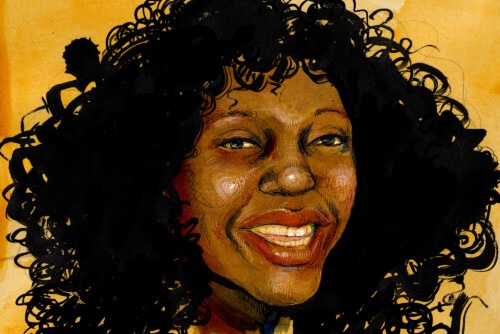On Saturday, 9 April 2005, the Center celebrated the 30th anniversary of the hallmark of its public programming: the Scholar & Feminist Conference. Leaders of second wave feminist movements, some of the most distinguished participants of the conference’s earlier days, joined their third wave counterparts in a daylong conversation aimed at where we, as feminists, have been, where we are, and where we might yet go. Four hundred people, including a great number of students, gathered to hear such visionary speakers as novelist Dorothy Allison, academic Amrita Basu, Ford Foundation VP Alison Bernstein, talk show host Rachel Maddow, and activist Faye Wattleton. In this section of the journal, you’ll find summaries, transcripts and video excerpts of these memorable and productive conversations.
Panel 1
Building and Using Political Power: Women Making Change
Participants: Amrita Basu, Alison Bernstein, Terry O’Neill, Rachel Maddow, Faye Wattleton
Moderator: Leslie Calman
Text: Summary | Full Transcript (PDF, 176 KB)Video Clips: Play Clip 1
Leslie Calman, Terry O’Neill, Allison Bernstein, Faye Wattleton, and Rachel Maddow discuss not only the ways in which the religious right has used the language of “values” to hijack fruitful and meaningful political debate, but also the promises and the perils that the left faces when it engages in “values-based” politics
Panel 2
Women and Resistance: Grassroots and Global Activism
Participants: Jennifer Kern, Minnie Bruce Pratt, Barbara Ransby, Heisoo Shin, Kumkum Sangari, Lateefah Simon
Moderator: Temma Kaplan
Text: Summary | Full Transcript (PDF, 184 KB)
Video Clips: Play Clip 1
Kumkum Sangari outlines the successes and failures of the women’s movement in India Play Clip 2
Jennifer Kern discusses how coalitional politics has nurtured the growth of the international disability rights movement Play Clip 3
Lateefah Simon shares the “revolutionary ideology” of recruiting young, poor, at-risk women-of-color into actively participating in movements for social change Play Clip 4
Historian Barbara Ransby explores the importance of understanding the past in order to forge a vision for a more just future Play Clip 5
Heisoo Shin challenges Americas, and American women in particular, to change their government for the betterment of humans around the world Play Clip 6
In response to an audience member’s question, Minnie Bruce Pratt takes up the issue of building an anti-imperialist feminist movement Play Clip 7
Moderator Temma Kaplan closes the panel with a call to keep informed, to organize and to demonstrate
Panel 3
Class, Race, and Sex: The Future of Difference
Participants: Siobhan Brooks, Leslie Feinberg, Amber Hollibaugh, Surina Khan
Moderator: Elizabeth Bernstein
Text: Summary | Full Transcript (PDF, 176 KB)
Video Clips: Play Clip 1
Siobhan Brooks talks about the challenges of claiming a feminist identity in communities of color, and the larger issue of being marginalized within an already marginalized group Play Clip 2
Surina Khan discusses the need to identify and “[shift] power structures” not only in the systems we’re working to change, but also within our own movements Play Clip 3
Leslie Feinberg identifies the social and political conditions that prove “the most fertile ground for coalition building” Play Clip 4
Amber Hollibaugh urges each of us to take responsibility for the limitations of the movements to which we belong, and to strive to do the work that those limitations leave undone
Panel 4
Women’s Culture: Media, Art and Modes of Cultural Production
Participants: Meena Alexander, Dorothy Allison, Tammy Rae Carland, Staceyann Chin, Elaine Kim
Moderator: Ann Cvetkovich
Text: Summary | Full Transcript (PDF, 164 KB)
Video Clips: Play Clip 1
Ann Cvetkovich, Staceyann Chin, and Tammy Rae Carland discuss what it means to be an “artist” and how notions of feminism have changed that term Play Clip 2
Tammy Rae Carland discusses the development of her own record label and the connection between “material support” and making art Play Clip 3
Ann Cvetkovich, Elaine Kim, Meena Alexander, Dorothy Allison address the artist’s role(s) in politics and movements for social justice



